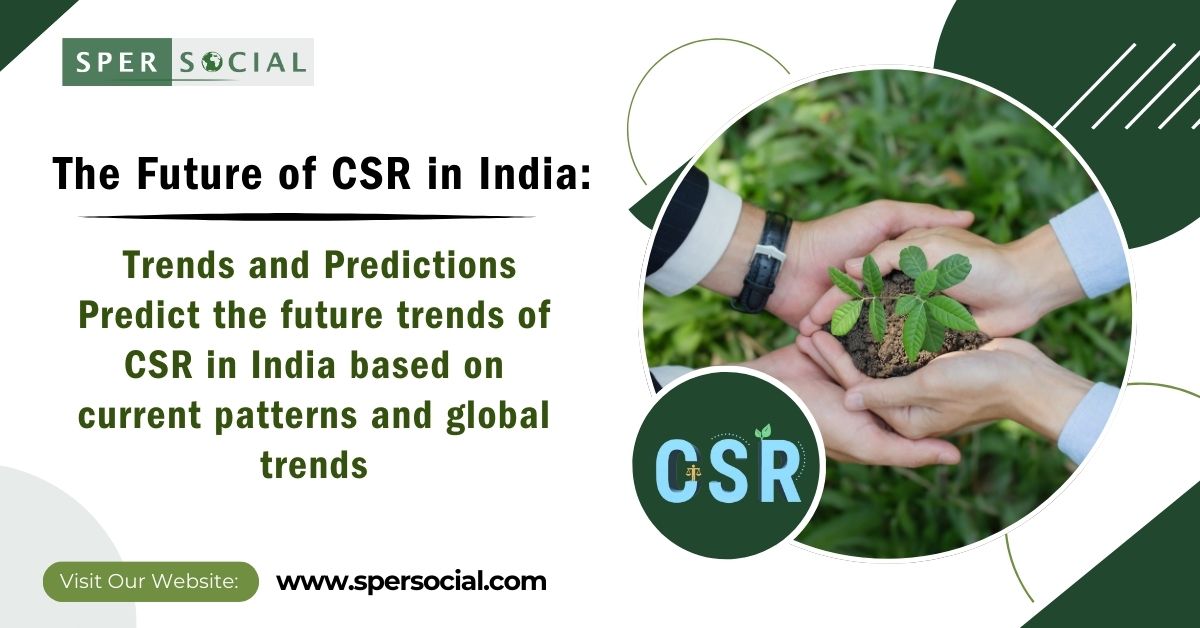
Introduction
Corporate Social Responsibility (CSR) has evolved from a voluntary practice into an essential component of modern business strategy. Defined as the commitment of businesses to contribute to sustainable economic development by working with employees, their families, the local community, and society at large to improve quality of life, CSR has become a critical measure of a company’s ethical standing. In India, the significance of CSR has grown exponentially, driven by both regulatory frameworks and increasing consumer awareness. As India continues to develop economically and socially, the future of CSR in the country is set to be shaped by new trends and challenges.
1> The Evolution of CSR in India:
Historical Perspective of CSR in India - The concept of CSR in India is deeply rooted in the country’s cultural and religious ethos, where the notion of charity and social good has been prevalent for centuries. During the pre-industrial period, wealthy merchants would often contribute to society by building temples, schools, and other public amenities. The industrialization phase saw business leaders like J.R.D. Tata and G.D. Birla actively engaging in philanthropy, laying the groundwork for modern CSR practices.
Key Milestones in Indian CSR - One of the significant milestones in the evolution of CSR in India was the introduction of the Companies Act, 2013, which made it mandatory for companies of a certain size to spend at least 2% of their average net profit on CSR activities. This legislation marked a shift from voluntary to mandatory CSR, driving increased corporate participation in social and environmental causes.
The Impact of Government Regulations on CSR - Government regulations have played a pivotal role in shaping the CSR landscape in India. The mandatory CSR clause under the Companies Act, 2013, not only increased corporate contributions to social causes but also brought about greater transparency and accountability in CSR activities. Companies are now required to disclose their CSR initiatives in their annual reports, ensuring that their contributions are in line with their stated objectives.
2> Current CSR Practices in India:
Leading Sectors in CSR Activities - In India, the education, healthcare, and rural development sectors have been the primary beneficiaries of CSR activities. Companies have focused on building schools, providing healthcare facilities, and improving infrastructure in rural areas, contributing to the overall development of the country. The focus on these sectors aligns with the government’s broader development goals and has led to significant improvements in the quality of life for many communities.
Case Studies of Successful CSR Initiatives - Several companies in India have implemented successful CSR initiatives that have made a lasting impact. For example, Tata Group’s focus on water conservation and education has transformed lives in many rural areas. Similarly, ITC’s e-Choupal initiative, which connects rural farmers with markets, has improved the livelihoods of thousands of farmers across the country. These case studies highlight the potential of CSR to drive positive change when implemented effectively.
The Role of NGOs and Social Enterprises - Non-Governmental Organizations (NGOs) and social enterprises have become crucial partners in the implementation of CSR initiatives. These organizations possess the expertise and on-ground presence needed to execute CSR projects effectively. Collaborations between corporates and NGOs have led to more impactful and sustainable CSR activities, ensuring that the benefits reach the intended recipients.
3> Predictions for the Future of CSR in India:
Integration of CSR with Business Strategy - In the future, CSR is expected to become even more integrated with overall business strategy. Rather than being seen as a separate entity, CSR will be embedded into the core operations of companies, influencing decisions related to product development, supply chain management, and customer engagement. This shift will enable businesses to create shared value, benefiting both the company and society.
The Expansion of Global CSR Standards - As globalization continues to connect markets, Indian companies will increasingly align their CSR practices with global standards. This includes adopting frameworks such as the United Nations Sustainable Development Goals (SDGs) and the Global Reporting Initiative (GRI). By adhering to these standards, Indian companies can enhance their reputation on the global stage and attract international investment.
4> Challenges Facing the Future of CSR:
Balancing Profit with Purpose - One of the biggest challenges for companies is balancing profit with purpose. While CSR can drive long-term value, it often requires significant investment in the short term. Companies must navigate the tension between meeting shareholder expectations and investing in social and environmental initiatives that may not yield immediate financial returns.
Overcoming Regulatory and Compliance Hurdles - As CSR regulations evolve, companies will need to stay compliant with both national and international standards. This can be particularly challenging in a rapidly changing regulatory environment. Companies must invest in compliance systems and processes to ensure that their CSR activities meet legal requirements and reflect best practices.
Conclusion
The future of CSR in India is bright, with emerging trends pointing towards greater integration of CSR into business strategy, a focus on environmental sustainability, and the influence of socially conscious consumers. However, challenges remain, particularly in balancing profit with purpose and measuring the impact of CSR activities. By navigating these challenges and embracing new opportunities, Indian companies can continue to drive positive change and contribute to the country’s sustainable development.
SPER SOCIAL
SPER SOCIAL, your premier destination for innovative solutions in Corporate Social Responsibility (CSR) and Environmental, Social, and Governance (ESG) initiatives. At SPER SOCIAL, we pride ourselves on our expertise, tailored solutions, global perspective, and commitment to long-term impact. With a passion for sustainability and a dedication to making a difference, we empower organizations to navigate the complexities of CSR and ESG with confidence and purpose.
#303-304, Tower B, Noida One, Sector 62, Noida, India
contact@spersocial.com
+1-347-460-2899
+91-959-915-8047
